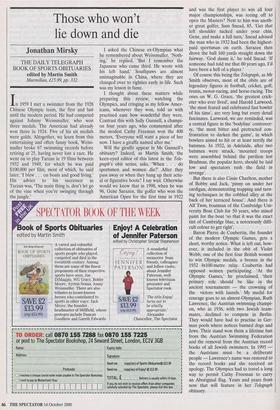Those who won't lie down and die
Jonathan Mirsky
THE DAILY 'TELEGRAPH BOOK OF SPORTS OBITUARIES edited by Martin Smith Macmillan, £15.99, pp. 332 In 1959 I met a swimmer from the 1928 Chinese Olympic team, the first and last until the modern period. He had competed against Johnny Weissmuller, who won three medals. The American had already won three in 1924. Five of his six medals were golds. Altogether, we learn from this entertaining and often funny book, Weiss- muller broke 67 swimming records before retiring at 25, having never lost a race. He went on to play Tarzan in 19 films between 1932 and 1949, for which he was paid $100,000 per film, most of which, he said later, 'I blew . . . on boats and good living.' His advice to his successor as Tarzan was, 'The main thing is, don't let go of the vine when you're swinging through the jungle.' I asked the Chinese ex-Olympian what he remembered about Weissmuller. 'Noth- ing,' he replied. 'But I remember the Japanese who came third. He wrote with his left hand.' Southpaws are almost unimaginable in China, where they are changed over to righties early in life. Such was my lesson in fame.
I thought about these matters while preparing this review, watching the Olympics, and cringing as my fellow Amer- icans, whenever they won, told us with practised ease how wonderful they were. Contrast this with Sally Gunnell, a champi- on four years ago, who commented after the modest Cathy Freeman won the 400 meters, 'Everyone will want a piece of her now. I have a giraffe named after me.'
Will the giraffe appear in Ms Gunnell's obituary? Indeed, as Martin Smith, the keen-eyed editor of this latest in the Tele- graph's obit series, asks, 'When . . . do sportsmen and women die?' After they pass away or when they hang up their actu- al or figurative boots? I say wait. Otherwise would we know that in 1998, when he was 96, Gene Sarazen, the golfer who won the American Open for the first time in 1922 and was the first player to win all four major championships, was teeing off to open the Masters? Next to him was anoth- er great golfer, Sam Snead, 85. 'Get that left shoulder tucked under your chin, Gene, and make a full turn,' Snead advised the man who in 1932 had been the highest paid sportsman on earth. Sarazen then drove the ball 160 yards straight down the fairway. 'God damn it,' he told Snead. 'If someone had told me that 80 years ago, I'd have been a hell of a player.'
Of course this being the Telegraph, as Mr Smith observes, most of the obits are of legendary figures in football, cricket, golf, tennis, motor-racing, and horse-racing. The ones on W. G. Grace, 'the greatest crick- eter who ever lived', and Harold Larwood, `the most feared and celebrated fast bowler of his time', are very long but every detail fascinates. Larwood, we are reminded, was a central figure in the 'bodyline' controver- sy, 'the most bitter and protracted con- frontation to darken the game', in which bowlers aimed to hit or at least terrify the batsmen. In 1932, in Adelaide, after two batsmen were struck, 'mounted troops were assembled behind the pavilion lest Bradman, the popular hero, should be laid low and spectators rush the field in revenge'.
But there is also Cissie Charlton, mother of Bobby and Jack, 'pinny on under her cardigan, demonstrating trapping and turn- ing techniques in the cobbled alley at the back of her terraced house'. And there is Alf Twin, boatman of the Cambridge Uni- versity Boat Club for 50 years, who mixed paint for the boat `so that it was the exact tint of Cambridge blue, a notoriously diffi- cult colour to get right'.
Baron Pierre de Coubertin, the founder of the modern Olympic Games, gets a short, worthy notice. What is left out, how- ever, is included in the obit of Violet Webb, one of the first four British women to win Olympic medals, a bronze in the 1932 4x100-metre relay. Coubertin had opposed women participating. 'At the Olympic Games,' he proclaimed, 'their primary role should be like in the ancient tournaments — the crowning of the victors with laurels.' My medal for courage goes to an almost-Olympian, Ruth Lawrence, the Austrian swimming champi- on, who in 1936, with two Jewish team- mates, declined to compete in Berlin. They would have had to practise in Ger- man pools where notices banned dogs and Jews. Their stand won them a lifetime ban from the Austrian Swimming Federation and the removal from the Austrian record books of all Jewish swimmers. In 1995 — the Austrians must be a deliberate people — Lawrence's name was restored to the record books and she received an apology. The Olympics had to travel a long way to permit Cathy Freeman to carry an Aboriginal flag. Years and years from now that will feature in her Telegraph obituary.


















































































 Previous page
Previous page